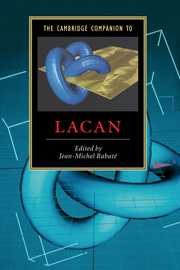Book contents
- Frontmatter
- 1 Lacan’s turn to Freud
- 2 The mirror stage: an obliterated archive
- 3 Lacan’s myths
- 4 Lacan’s science of the subject: between linguistics and topology
- 5 From the letter to the matheme: Lacan’s scientific methods
- 6 The paradoxes of the symptom in psychoanalysis
- 7 Desire and jouissance in the teachings of Lacan
- 8 Lacan and philosophy
- 9 Lacan’s Marxism, Marxism’s Lacan (from Žižek to Althusser)
- 10 Ethics and tragedy in Lacan
- 11 A Lacanian approach to the logic of perversion
- 12 What is a Lacanian clinic?
- 13 Beyond the phallus: Lacan and feminism
- 14 Lacan and queer theory
- 15 Lacan’s afterlife: Jacques Lacan meets Andy Warhol
- Further reading
- Index
- Series List
5 - From the letter to the matheme: Lacan’s scientific methods
Published online by Cambridge University Press: 28 May 2006
- Frontmatter
- 1 Lacan’s turn to Freud
- 2 The mirror stage: an obliterated archive
- 3 Lacan’s myths
- 4 Lacan’s science of the subject: between linguistics and topology
- 5 From the letter to the matheme: Lacan’s scientific methods
- 6 The paradoxes of the symptom in psychoanalysis
- 7 Desire and jouissance in the teachings of Lacan
- 8 Lacan and philosophy
- 9 Lacan’s Marxism, Marxism’s Lacan (from Žižek to Althusser)
- 10 Ethics and tragedy in Lacan
- 11 A Lacanian approach to the logic of perversion
- 12 What is a Lacanian clinic?
- 13 Beyond the phallus: Lacan and feminism
- 14 Lacan and queer theory
- 15 Lacan’s afterlife: Jacques Lacan meets Andy Warhol
- Further reading
- Index
- Series List
Summary
How can we ask questions about the language in which we have our intellectual being as it were?
Georg Kreisel in Gödel RememberedThe book of nature is written in a mathematical script. Human nature finds itself called upon to decipher this text, and it is perhaps more deeply implicated in this activity than a mere external reader would be. The idea that there is a text outside that demands attentive and renewed reading fails to do justice to the complexities postulated by Freud, for whom the unconscious is equipped with its own inner text. Any reading that is to be done then presupposes the existence of a relation between these interiorities and an exterior that they are engaged with. There is a question here of giving an interpretation of a text, but there is also a question of whether a mathematician may be needed in order to address these questions of exterior, interior, and the frontier between them.
The psychoanalyst is called on to be a poet – or, as Jacques Lacan occasionally phrased it, to be a poem. Analytical work, at the same time, “scientifically” purifies the subject. Lacan held to both these opinions, and he was not alone in the analytical movement in wanting to bridge the gap between them. Such themes were present from the beginnings of psychoanalysis. Freud put forward claims on both sides of this divide; on the one hand, he described how words have a magical power, and on the other, he suggested that psychoanalysis can be formalized as a science.
- Type
- Chapter
- Information
- The Cambridge Companion to Lacan , pp. 69 - 85Publisher: Cambridge University PressPrint publication year: 2003
- 4
- Cited by



